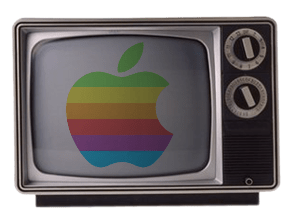There’s a problem with the idea of an iTV, rumors of which have been sloshing about for a long time, but with greater intensity since Steve Jobs’ biography hinted at one. Unlike an Apple TV, an iPhone, an iPad, or other devices, an Apple TV wouldn’t be tied to a Mac, and it wouldn’t take advantage of iTunes the way those devices do. It’ll be related, of course, but it doesn’t promote the “hub” idea that drives iPhone owners to buy Macs, Mac owners to buy iPhones, and all the other crossover purchases that interweave the Apple ecosystem.
Instead, it would be an Apple-designed window into content that Apple has very little control over. And while you can bring a new idea to the TV space, as set-top boxes and Google TV have, you can’t make the TV space play nice. Google learned that the hard way. And it looks like Apple may be facing a similar challenge.
USA Today has a story on the so-called iTV, with a few juicy nuggets hidden amongst a bedding of fluff. They say that Jonathan Ive has a big, beautiful 50-inch television in his studio. And several sources describe difficulties on Apple’s part securing the content that would be necessary to make their device worthwhile. After all, people using a next-generation content consumption device don’t want to be told that Fox shows are available but not Universal ones. We’re supposed to be leaving all that 20th-century dross behind.
The thing is that guys meeting with Apple over show licenses aren’t stupid. They’ve seen what Apple has done to the music industry over ten years, and they have no intention of entering the lion’s mouth, as their friends at the labels did. In the early 2000s, of course, the labels had no idea that Apple was a lion, and really, neither did Apple. But things are different now, and the guys at Warner and HBO and Turner and so on are happy to make a power play. After all, until someone revolutionizes the channel by which people at large get their TV shows, they’re still king. And Apple can’t revolutionize without their express permission.
That’s not to say they don’t recognize an opportunity. They smell money, but they’re not willing to bite until they can be sure they aren’t falling into a trap. Some of them went along with Google for a lark, but as we saw, they didn’t like the way Google did business (they tend to want to give things away). Apple may be happy to charge, but they also tend to take quite a bit of the sale, and it’s likely that the content producers aren’t willing to let their prize possession, new TV shows, be used as a money-printing machine by Apple. And Apple doesn’t want to leave anything to the discretion of the content producers, who could deep-six the iTV at the drop of a hat and get into bed with Google purely out of spite. And believe me, the TV industry isn’t short on spite.
Difficulties, however, are not failures. They are made to be overcome, and Apple, if it indeed has its sights set on the living room and the burgeoning net-broadcast TV sector (for which people can be made to pay handsomely), will do what it needs to in order to seal the deal. Time, in the end, is on their side: they are sitting on enough money to choke the entirety of the TV business, and they know that their device will be a moneymaker for all involved (not the users, naturally). “Softly, softly, catchy monkey” is their motto. Google’s was a bit more “Leeroy Jenkins”.
Note that there is plenty of time for this to pan out, and the devices we’ll be seeing at CES next week will have a long, full life (which is to say, about six months) before we start seeing the inevitable reports from Digitimes of Apple ordering five million 50-inch LCD panels.
